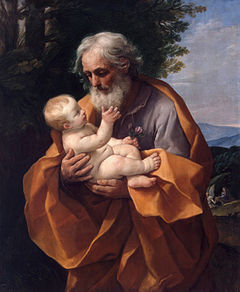Solemnity of Saint Joseph
| Feast of Saint Joseph | |
|---|---|

Saint Joseph with the Infant Jesus by Guido Reni, c 1635
|
|
| Observed by |
Catholic Church Lutheran Church |
| Celebrations | Carrying blessed fava beans, wearing red-coloured clothing, assembling home altars dedicated to Saint Joseph, attending a Saint Joseph's Day parade |
| Observances | Church attendance at Mass or Divine Service |
| Begins | March 19 |
| Date | March 19 |
| Frequency | annual |
Saint Joseph's Day, March 19, the Feast of Saint Joseph is in Western Christianity the principal feast day of Saint Joseph, husband of the Blessed Virgin Mary. He is the foster-father of Jesus Christ. It has the rank of a solemnity in the Roman Catholic Church. It is a feast or commemoration in the provinces of the Anglican Communion, and a feast or festival in the Lutheran Church. Saint Joseph's Day is the Patronal Feast day for Poland as well as for Canada, persons named Joseph, Josephine, etc., for religious institutes, schools and parishes bearing his name, and for carpenters. It is also Father's Day in some Catholic countries, mainly Spain, Portugal, and Italy. It is a holiday of obligation for Roman Catholics, unless the particular Episcopal Conference has waived the obligation.
March 19 was dedicated to Saint Joseph in several Western calendars by the 10th century, and this custom was established in Rome by 1479. Pope Pius V extended its use to the entire Roman Rite by his Apostolic Constitution Quo primum (July 14, 1570). Originally a double of the second class and a feast of precept, it was re-raised to be of precept in 1917 after having this status intermittently lost, and consequently also raised to its current rank of double of the first class (now called a solemnity), having become in the meantime the rank common to all remaining general feasts of precept. Since 1969, Episcopal Conferences may, if they wish, transfer it to a date outside Lent.
...
Wikipedia
